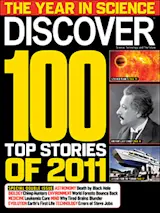In an atom smasher on long island, gold nuclei smash headlong into each other at nearly the speed of light, unleashing a fountain of matter and antimatter, which possess identical mass but reverse properties. Within that maelstrom, physicists have now found 18 particles of anti-helium-4: the antimatter twin of helium, and the heaviest piece of antimatter ever made.
The more massive a particle, the less likely it is to form. To create antihelium-4, two antiprotons and two antineutrons have to come together at once, one-in-28-billion odds. The scarcity of antihelium-4 exactly matches predictions, a powerful confirmation of particle theory. The results could also help determine why the universe is biased against antimatter. “The Big Bang should have produced quarks and antiquarks in equal numbers, yet we see only matter all around us,” says physicist Steven Vigdor at the Relativistic Heavy Ion Collider, where the antihelium was created.
Probably most of the matter and antimatter annihilated each other, leaving just a slight imbalance of matter. If there are any pockets of antimatter still lurking in deep space, though, that would reveal a lot about what happened during that early era. An orbiting detector called the Alpha Magnetic Spectrometer is on the hunt. Since antihelium forms so rarely, we now know, any such particles that show up would most likely be leftovers from the Big Bang.














